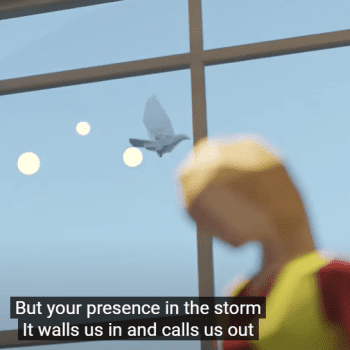
Reprinted from The Green Room.
A few months ago, I attended the Acton Institute (you can read more about my trip here) as part of my work with the Theology of Work Project. One of the things I did was attend a lunch where some other folks from TOW presented some of the resources on our site and talked about how they could be used in the local church. We concluded the lunch by singing a hymn called “God of Offices and Kitchens.” It attempts to bring the experiences of the modern workplace in contact with the praise of God:
Ploughing, seeding, patient waiting
For the harvest of the soil;
Typing, phoning and collating
You are with us in our toil.
In the workshop, store and office,
Classroom, kitchen, garden, too,
Help us see your gift and glory,
Serve you well in all we do.
My husband was at the conference but not at the lunch. I told him about it afterwards and said, “I felt really weird about singing about typing, phoning, and collating in a hymn. Is this just because those are new things to sing about, or is there really something different about those things than about ploughing and seeding and harvesting, which sounded perfectly normal to sing about?”
He said “It’s all in Barfield.” (He’s an Owen Barfield scholar, among other things.)
Barfield, who was one of C. S. Lewis’s oldest and dearest friends, wrote a number of books that are a good deal less famous among Christians than Lewis’s but are well-known to a number of philosophers. One, called Saving the Appearances, argues that humans once
had an awareness (termed original participation) of nature and reality that ended as human consciousness has grown increasingly self-aware and analytical…
Saving the Appearances is dense (I’ve read it!) but I can tell you that some of the things Barfield thinks “did in” that sense of original participation are the Scientific Revolution and the Industrial Revolution. He doesn’t think we can get back there–he thinks we need to move towards a “final participation,” for which in some way the avenue was cleared for us by the Incarnation. But his arguments explain why singing about ploughing, which humans have done for millennia back when we were aware of ourselves as part of nature, feels different than singing about typing, which humans have done for about 100 years long after our divorce from a mostly-nature-focused way of life.
I filed this thought away until recently, when I ran into some thoughts from an essay called “The Little Birds who Won’t Sing,” from one of my favorite writers and one who also influenced Lewis (though he was of a previous generation): G. K. Chesterton. Chesterton asked the same question I was asking at Acton:
How did people come to chant rude poems while pulling certain ropes or gathering certain fruit, and why did nobody do anything of the kind while producing any of the modern things? Why is a modern newspaper never printed by people singing in chorus? Why do shopmen seldom, if ever, sing?
If reapers sing while reaping, why should not auditors sing while auditing and bankers while banking? If there are songs for all the separate things that have to be done in a boat, why are there not songs for all the separate things that have to be done in a bank?
True to his indomitable form, Chesterton attempted to provide a few:
Up my lads and lift the ledgers, sleep and ease are o’er.
Hear the Stars of Morning shouting: ‘Two and Two are four.’
Though the creeds and realms are reeling, though the
sophists roar,
Though we weep and pawn our watches, Two and Two are Four.[and, for the post office,]
O’er London our letters are shaken like snow,
Our wires o’er the world like the thunderbolts go.
The news that may marry a maiden in Sark,
Or kill an old lady in Finsbury Park.
He presented some of these lyrics to a banker of his acquaintance, who responded that there was
an indefinable something in the very atmosphere of the society in which we live that makes it spiritually difficult to sing in banks.
Chesterton goes on:
And the more I thought about the matter the more painfully certain it seemed that the most important and typical modern things could not be done with a chorus. One could not, for instance, be a great financier and sing; because the essence of being a great financier is that you keep quiet. You could not even in many modern circles be a public man and sing; because in those circles the essence of being a public man is that you do nearly everything in private.. . I had really got no further than the sub-conscious feeling of my friend the bank-clerk—that there is something spiritually suffocating about our life; not about our laws merely, but about our life.
It’s been one of the cardinal principles of the faith and work movement that all work, except that work which is obviously immoral or illegal, is equal: all work derives from God’s command to us to keep and steward creation, and every job can be done to the glory of God.
But Barfield, Chesterton, and my own experience all have me wondering. Do we need to acknowledge that work may be different since the Industrial Revolution? That it may be less back-breaking, but it also may be more soulless? Or if the faith and work movement goes on long enough, will we all someday find it perfectly natural to sing about typing as an ennobling vocational act? (I already find Chesterton’s intended-to-be-funny verses less funny, and more possible to conceive of singing “straight,” than I did 20 years ago. I am not sure that is an improvement.)













